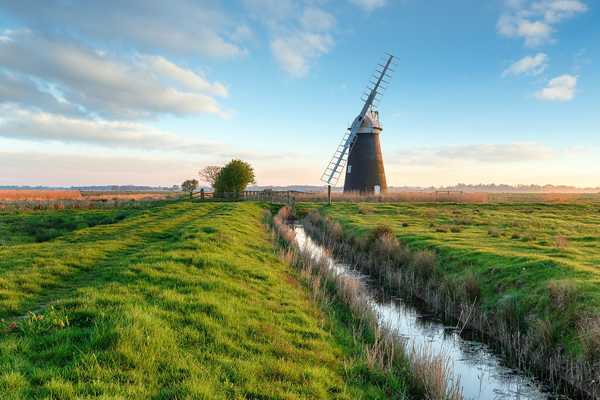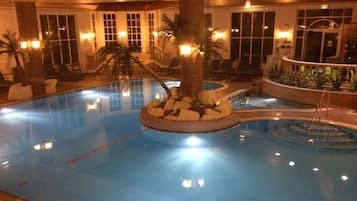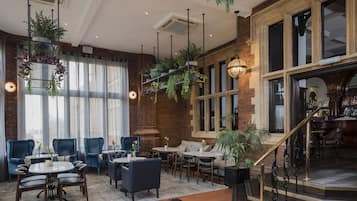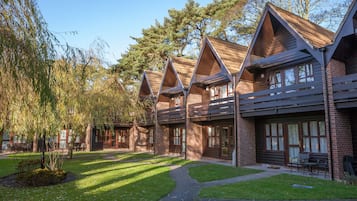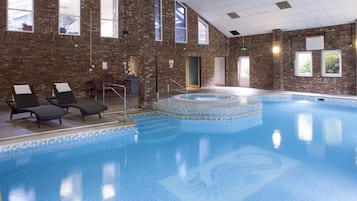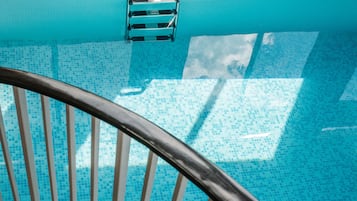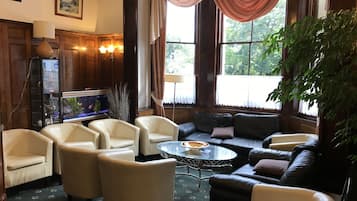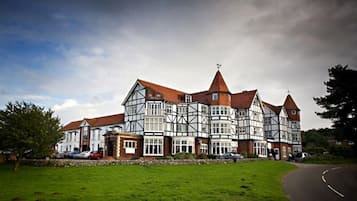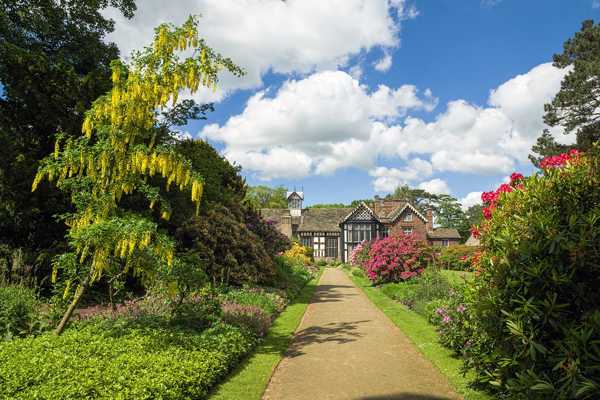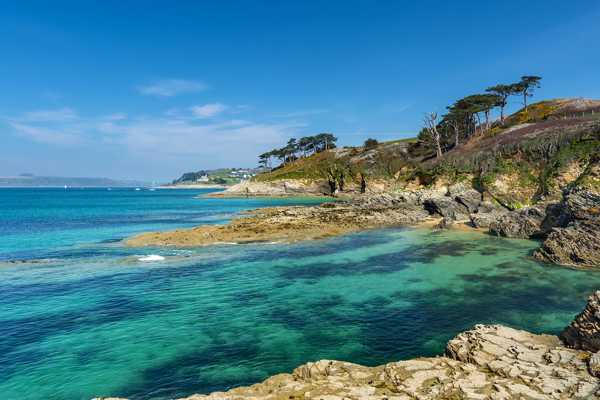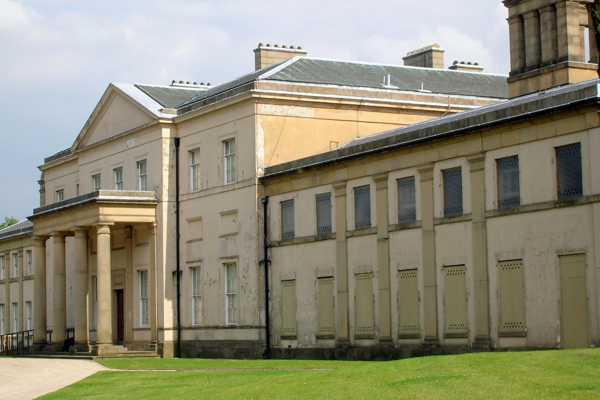Many villages in Norfolk make great bases for exploring the region's wide open countryside and spectacular coastline. Much of North Norfolk is designated as an Area of Outstanding Natural Beauty, where you can unwind on Blue Flag beaches, discover fossils on the Deep History Coast, and tackle miles of trails in national nature reserves.
There are many stately homes, churches and shrines, and medieval streets to explore in Norfolk’s many villages and towns. You can also hop aboard a steam railway for a leisurely journey with spectacular countryside views. If you need to escape the city life, head out of Norwich on a road trip to the villages of Norfolk.
- 1
Wroxham
An excellent base for exploring the Norfolk Broads

- Adventure
- Photo
Wroxham, together with Hoveton, is known as the capital of the Norfolk Broads. Thanks to its riverside setting, it’s an excellent place for those seeking a boating holiday in Norfolk. A must-visit is the Hickling Broad, where you can spot the rare Norfolk hawker dragonfly and swallow-tail butterfly, as well as migrating ospreys and spoonbills.
The village lies on the bank of the River Bure, about 8 miles northeast of Norwich. If you’re in Aylsham, you can get to Wroxham via the Bure Valley Railway steam train. The 18-mile roundtrip offers excellent views of the pretty countryside and the River Bure.
Map - 2
Blakeney
Explore flint cottages and 15th-century remains

- Families
- History
- Photo
The village of Blakeney is known for its proximity to Blakeney Point, home to England’s largest grey seal colony. Part of Norfolk’s Area of Outstanding Natural Beauty (AONB), it makes an excellent base for outdoor activities such as coastal walks and wildlife-watching tours.
Flint cottages, coastal pubs, local shops and art galleries dot the central area of Blakeney. Prominent landmarks include Blakeney Guildhall and St Nicholas Church, both of which date back to the 15th century. If you want to see newborn seal pups, the best time to visit Blakeney is between November and early January.
Map - 3
Walsingham
A Norfolk village with a long history of religious pilgrimage

- History
- Photo
Walsingham is the combined village of 2 settlements, namely Great Walsingham and Little Walsingham. It offers plenty of things to see for history fans, thanks to its reputation as a major centre of pilgrimage. The village is famous for the Shrine of Our Lady of Walsingham, which dates back to the early 11th century.
The village has medieval streets lined with quaint tearooms, local pubs and historic structures like the Walsingham Priory, the Roman Catholic Church of the Annunciation, and Shirehall Museum. Walsingham can get rather busy during the pilgrimage season, which runs between Easter and late October.
Map - 4
Cromer
Enjoy a dive trip to ‘Britain’s Great Barrier Reef’

- Adventure
- History
- Photo
Cromer has a traditional Victorian pier that stretches out 430 ft over the North Sea. It’s home to Pavilion Theatre, the world’s only “end-of-the-pier” theatre, where you can enjoy live shows such as stand-up comedy and musical cabarets. The seaside town is dominated by Cromer Parish Church’s 160-ft-tall tower. The 14th-century cathedral has stained glass windows commemorating the places and people of Cromer.
Just offshore is the 20-mile-long Cromer Shoal Chalk Bed, which dates back to the Mesozoic era. It’s about 25 ft below the surface, so you can swim and snorkel to see towering arches, deep chasms, and spectacular sea life.
Map - 5
Holt
A market town with Georgian structures in North Norfolk

- History
- Photo
- Shoppers
Holt is defined by its elegant Georgian buildings and pretty flint stone yards. This North Norfolk market town is excellent for shopping, especially if you prefer locally made goods. Expect to find loads of speciality shops, galleries and antique shops tucked away in charming courtyards.
Holt has many historic sites that you can explore by following the Holt Owl Trail. It follows a circular loop, with 24 informative owl pavement plaques describing the history of each building and street. Must-sees include a Grade II-listed war memorial, St. Andrew’s Church, and Hanworth House.
Map - 6
Horning
A charming village dating back to the 11th century

- Adventure
- History
- Photo
Horning is a picturesque village in the Norfolk Broads, between the Bure Marshes and How Hill National Nature Reserves. Established in 1020, it lies on the north bank of the River Bure and makes a great place for sailing and boating.
The village has many pubs and shops, as well as a village green that hosts a festival in summer. Popular events that take place here include the Boat Regatta, Horning Boat Show, and Three Rivers Race. Less than a mile northwest of Horning is BeWILDerwood Norfolk, an award-winning adventure park spanning 18 acres of zip lines, treehouses, and marshes.
Map - 7
Cley next the Sea
Enjoy birdwatching in the renowned nature reserve

- History
- Photo
The village of Cley next the Sea lies on the River Glaven, between Blakeney and Holt on the North Norfolk Heritage Coast. It was once among the busiest ports in England, resulting in many Flemish gables and historic buildings dotting its centre.
The village’s most prominent landmark is the 18th-century Cley Windmill, located close to the Cley Marshes nature reserve. The 5-storey tower mill now serves as a B&B, offering great views over the marshland. Cley next the Sea is also dominated by the Grade I-listed medieval church of St Margaret's, built between 1320 and 1340.
Map - 8
Sheringham
A traditional seaside town on the Deep History Coast

- History
- Photo
Sheringham is a seaside town that still retains much of its fishing village charm. It lies on the Deep History Coast, a 22-mile stretch of coastline between Cart Gap and Weybourne. You can find a pretty promenade with colourful beach huts fronting the town’s Blue Flag beach, as well as colourful murals on the sea defences.
The Cromer Shoals Chalk Bed is just offshore between Sheringham and Cromer, spanning over 20 miles in length. Nicknamed ‘Britain’s Great Barrier Reef’, it has diverse sea life, such as anemones, starfish, sponges, and brittle stars. Sheringham hosts many festivals throughout the year, including the Viking Festival, Stream Gala, and Sheringham Carnival.
Map - 9
Mundesley
A self-contained village with a Blue Flag beach

- Adventure
- Families
- Photo
Mundesley is a quintessential seaside village for families on the north Norfolk coastline. It has a pristine beach with a Blue Flag status, with a promenade lined colourful beach huts, shallow rock pools, and safe swimming at low tide.
The village itself is very pretty, thanks to thatched cottages, independent shops, village halls and kid-friendly parks. If you’re into country walks, Mundesley also has many well-marked footpaths, circular routes and walking trails. Popular walks include the Mundesley Circular Walk, Norfolk Coast Path, and Paston Way.
Map - 10
Holkham
Great for escaping city crowds

- Adventure
- History
- Photo
Holkham is a small village at the centre of the Holkham National Nature Reserve in North Norfolk. One of its most popular landmarks is Holkham Hall, an 18th-century Palladian house with a lake, all surrounded by rolling parkland.
There are plenty of things to do in the Holkham National Reserve year-round. It covers almost 9,200 acres, with natural habitats like sand dunes, pine woodland, beaches, and marshes. Part of the North Norfolk Heritage Coast, Holkham Gap is a pristine beach with a boardwalk and platform overlooking Holkham Bay.
Map



